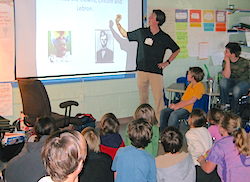Keep Parents Connected in the Middle Grades
 By Cheryl Mizerny
By Cheryl Mizerny
We’ve just had Parent Visiting Day at my school. It was endearing to see the students excited to show their parents around the building, point out their projects on display, and introduce them to their teachers. What’s more, parents get a glimpse into the daily lives of their children as they go through their schedule.
I’ll admit that it’s also gratifying when they hug me and say things like, “I don’t know how you do it. I’m exhausted!” or tell me that they had a lot of fun visiting in my class. It would be wonderful if there were more opportunities for such positive interactions.
Because I began my career as a special education teacher, I was accustomed to having a great deal of communication with parents. My philosophy was that the parents and I were on the same team.
When I transitioned to teaching English in middle school, I knew I wanted to keep the same level of interaction. I wanted to do more than merely keep parents informed. I wanted them to be engaged and realize their important role in their child’s education beyond elementary.
The parent-child relationship is changing
When children are young, it is simpler for parents to become a part of their child’s class, but this proves more difficult once students enter middle school.
 Children begin striving for independence and seek to establish their adolescent identity without the “interference” of their parents. Parents are caught off guard when their son or daughter suddenly begins breaking down the childhood bond.
Children begin striving for independence and seek to establish their adolescent identity without the “interference” of their parents. Parents are caught off guard when their son or daughter suddenly begins breaking down the childhood bond.
Because middle schoolers are walking contradictions, they are pushing parents away with one hand, while wanting their other hand to be held. Therefore, I try to incorporate ways for my students to remain connected to their parents as they navigate adolescence.
Some ways I involve MS parents
The very first homework assignment I give every year is for parents (to the delight of my students). I send home a simple writing prompt: In a Million Words or Less, Tell Me About Your Child. (Learn more.) Their responses are varied and valuable. Many even thank me for the opportunity.

As the year goes on, I give many assignments where adult interaction is an essential component.
• Students conduct interviews about family traditions and stories.
• They write poems about their grandparents.
• I ask parents to take pictures of themselves reading – “selfies” – for us to display in class.
• I encourage them to discuss the novel we are reading in class with their child (and many even end up reading the book).
• Students write persuasive letters to their parents.
 Beyond these family assignments, I email parents at the beginning of every new unit and invite them to participate by sharing their special skill sets. In addition, I also request parent feedback on each of the projects we do.
Beyond these family assignments, I email parents at the beginning of every new unit and invite them to participate by sharing their special skill sets. In addition, I also request parent feedback on each of the projects we do.
Not only is this feedback helpful in making improvements, it can be affirming of our work. One parent said, “What you have taught these students has gone far beyond the classroom and [my student] is a better person for having you in her life. I cannot thank you enough.”
We’re in it together
In all these small ways, parents are seamlessly integrated into their child’s class.
I know many teachers feel that parents are a necessary evil that comes with the territory of our chosen professions. At times, this can be true. However, I’ve found tremendous success by being as transparent and inclusive as possible.
I open the door to the classroom and invite them in. In doing so, we become teammates instead of adversaries. After all, we are on the same side—that of their child.
Cheryl Mizerny is a veteran educator with 20+ years experience–most at the middle school level. She began her career in special education, became a teacher consultant and adjunct professor of Educational Psychology, and currently teaches 6th grade English in Bloomfield Hills, Michigan. Cheryl writes about student motivation and engagement at The Accidental English Teacher and is a regular contributor to the SmartBrief SmartBlog on Education. Read more of her MiddleWeb articles here.

































